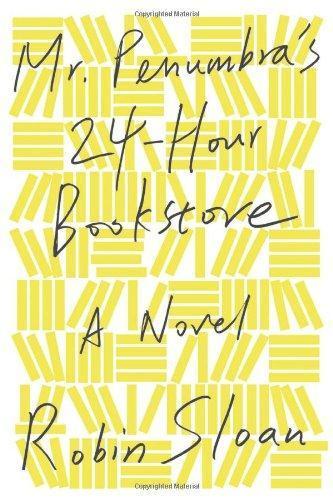Review of "Mr. Penumbra's 24-hour Bookstore" on 'Goodreads'
2 stars
Mr. Penumbra's 24-Hour Bookstore has an interesting conceit and a somewhat-compelling central mystery. However, it fails to execute in a couple of key areas, specifically exhibiting a limited understanding of technology and a healthy dose of misogyny.
Here is an excerpt which, in my opinion, captures both failures at once. Our protagonist Clay, his girlfriend Kat, and his best friend Neel are on a street in New York City.
There are many more New Yorkers who don't pass through the dark doorway, of course. The sidewalks on both sides of Fifth Avenue are full of them, a flex of humanity, tall and short, young and old, cool and uncool. Clots of pedestrians drift past us and block my view. Kat is agog.
"It's so small but there are so many people," she says, watching the human flow. "They're...it's like fish. Or birds and ant, I don't know. Some superorganism."
Neel cuts in: "Where did you grow up?"
"Palo Alto," she says. From there to Stanford to Google: for a girl obsessed with the outer limits of human potential, Kat has stayed pretty close to home.
Neel nods knowingly. "The suburban mind cannot comprehend the emergent complexity of a New York sidewalk."
"I don't know about that," Kat says, narrowing her eyes. "I'm pretty good with complexity."
"See, I know what you're thinking," Neel says, shaking his head. "You're thinking it's just an agent-based simulation, and everybody out here follows a pretty simple set of rules" -- Kat is nodding -- "and if you can figure out those rules, you can model it. You can simulate the street, then the neighborhood, then the whole city. Right?"
"Exactly. I mean, sure, I don't know what the rules are yet, but I could experiment and figure them out, and then it would be trivial--"
"Wrong," Neel says, honking like a game show buzzer. "You can't do it. Even if you know the rules--and by the way, there are no rules--but even if there were, you can't model it. You know why?"
My best friend and my girlfriend are sparring over simulations. I can only sit back and listen.
Kat frowns. "Why?"
"You don't have enough memory."
"Oh, come on--"
"Nope. You could never hold it all in memory. No computer's big enough. Not even your what's-it-called--"
"The Big Box."
"That's the one. It's not big enough. This box"--Neel stretches out his hands, encompasses the sidewalk, the park, the trees beyond--"is bigger."
Here, our female character has been decisively put into her place! Although she claims to be good with complexity, Neel clearly knows more than she does about both urban behavior and the technology needed to simulate it. Our narrator even gets in a cheap shot ("for a girl..."). If this were part of a longer piece where mansplaining and condescension were addressed in even a clumsy way, this might be acceptable. But Kat here is clearly cowed by the menfolk's superior knowledge.
Which is exasperating when you consider exactly how wrong that knowledge is. First, 8m New Yorkers would require incredibly sophisticated rules to fill the memory of even a single high-end server, much less to utilize even "The Big Box", which is described earlier in the book as holding "a copy of the web". And every computer programmer from Ada Lovelace to Admiral Grace Hopper to Margaret Hamilton knows that when you run out of room for your data in RAM, you write that data to your disk. But even though Kat is the rightful heir of these women's intellectual heritage, and the one who gave us the exposition about "the big box", here she falls silent in the face of Neel's superior knowledge.
Neel, for reference, is the CEO of a startup which digitizes breasts, which are referred to as "boobs" thrice for each time they're called "breasts". He is all class, this guy.
As for women in general, they are similarly ill-served. Sloan refers to "girls" 40 times, and "women" only 11. If a woman is desirable to our protagonist, she is a "girl"; if she is "a middle-aged woman with frizzy black hair [and] dusty blue mom-jeans", she might well be a woman. At no point is Kat referred to as a woman.
This is all petty stuff, to be honest. But reading the cited passage on first go made me think, "wow, what a jerk," and then "wow, how wrong is this bozo?", and it wasn't the only time.

